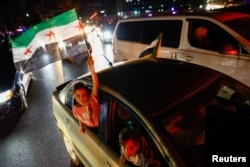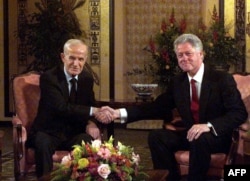For more than a decade, Syria stood as one of the world’s most isolated nations, battered by civil war, economic collapse, and the unyielding grip of international sanctions.
But on May 14, a dramatic shift unfolded on the world stage as US President Donald Trump met with Syria’s new president, Ahmed al-Sharaa -- a former insurgent known under the nom de guerre Abu Mohammed al-Jolani -- in Riyadh in the first meeting between the leaders of the two nations in a quarter of a century.
The move signals not only a new chapter for the war-torn country, but also a recalibration of regional alliances and power dynamics across the Middle East.
Speaking in the Saudi capital, Trump said the decision to lift sanctions, announced a day earlier, is meant to provide Syria “with an opportunity for greatness" as the country seeks to rebuild after more than a decade of civil war and economic devastation.
The sanctions, originally imposed to pressure the government of deposed President Bashar al-Assad, “now directly target the Syrian people and hinder the process of recovery and reconstruction,” the Syrian Foreign Ministry said after the announcement.
Welcoming Trump’s move, the ministry said the sanctions “contributed to [Assad’s] downfall” and added that Syrians “look forward to the full lifting of sanctions as part of steps that support peace and prosperity in Syria and the region.”
Indeed, Damascus erupted in celebration following Trump’s announcement, with many Syrians hopeful for economic relief.
"Syria now has a real opportunity to be brought back into the fold of the global economic system," Clara Broekaert, a research fellow at the Soufan Center focusing on foreign interference, told RFE/RL.
"This is not to suggest that the United States should relinquish all leverage -- particularly when it comes to ensuring, for example, the protection of minority rights -- but the existing sanctions regime would not do that and instead punish ordinary Syrians."
A Historic Meeting
The two met briefly in Riyadh on the sidelines Trump’s meeting with the leaders of the Gulf Cooperation Council.
The White House said Trump asked the Syrian leader to normalize relations with Israel by joining the so-called Abraham Accords, which have already been signed by some Gulf Arab states.
He also pushed for Sharaa to deport Palestinian militants and take control of camps holding Islamic State fighters that are currently being run by Kurdish guerillas who are opposed by Turkey.
The last such encounter was in 2000, when then-US President Bill Clinton met with Hafez al-Assad in Geneva.
Trump’s meeting with Sharaa signals a thaw in relations and offers de facto recognition of Syria’s new leadership, something unthinkable just months ago.
From Insurgent To President
Sharaa’s ascent to the presidency is a story few could have predicted. Sharaa fought against US forces in Iraq, later founding the Al-Qaeda-linked Jabhat al-Nusra, or the Nusra Front, during Syria’s civil war.
Over time, he distanced himself from Al-Qaeda, rebranding his group as Hayat Tahrir al-Sham and consolidating power in northwest Syria. In late December 2024, Sharaa led a coalition of rebel groups, many backed by Turkey, in a lightning offensive and seized Damascus, bringing an end to half a century of Assad family rule over Syria.
He then declared the dissolution of all armed factions -- including his own -- and assumed the presidency under his birth name, pledging constitutional reform and a new era for Syria.
Sharaa’s transformation from insurgent commander to head of state is both remarkable and controversial. While he has worked to project a pragmatic image, promising security for minorities and outreach to the international community, his past continues to raise concerns among Western and Israeli officials.
The insurgent-turned-president has faced challenges controlling factions affiliated with his transitional government. This struggle came into sharp focus in March, when clashes broke out between security forces and gunmen loyal to the fallen government of Iran- and Russia-backed Assad. Rights groups documented hundreds of casualties, including civilians.
Broekaert said that that, despite recent reforms, “persistent concerns” remain among US policymakers, including sectarian violence in the coastal provinces.
"What I am personally watching closely [is] the integration of foreign fighters into the new security and governance apparatus,” she said.
These issues, Broekaert added, “continue to fuel skepticism among influential policymakers in Washington regarding the durability and sincerity of these reforms.”
Yet, for many Syrians, Sharaa represents a break from decades of dictatorship and the possibility of reconstruction after years of devastation.
"Sharaa has also, frankly, very skillfully positioned his leadership and policy agenda as pragmatic and aligned with key strategic interests of the United States, particularly the containment of Iranian influence," Broekaert said.
Saudi Arabia's 'Pivotal' Role
The dramatic US policy reversal did not happen in a vacuum. Saudi Arabia, under Crown Prince Muhammed bin Salman, played a key role in orchestrating the diplomatic breakthrough.
Trump made his announcement at an investment conference in Riyadh on May 13, explicitly crediting the Saudi crown prince as the driving force behind the decision.
Saudi Arabia, joined by Turkey and several Gulf Arab states, lobbied Washington relentlessly, arguing that engaging with Sharaa’s government was essential for stabilizing Syria and curbing Iranian influence in the region.
The timing of the announcement coincided with Saudi Arabia’s commitment of a $600 billion investment in the United States and the signing of a record $142 billion arms deal, underscoring the extent of US-Saudi cooperation.
Noting Saudi Arabia's "pivotal" role, Broekaert said the Saudi crown prince "coupled diplomatic pressure with transactional incentives" to secure Trump’s engagement with the new Syrian leadership and to accelerate the lifting of sanctions.
How Will This Impact Other Regional Actors?
Trump’s embrace of Syria’s new government is reverberating across the region.
For Israel, the move is a source of deep unease. Israeli officials, wary of Sharaa’s jihadist past and the communal violence that accompanied his rise, fear that US normalization with Damascus could limit Israel’s freedom of action and embolden hostile actors. There are reports of indirect talks between Syria and Israel, possibly mediated by the United Arab Emirates, but Israeli skepticism remains high.
"It is clear that Israeli influence has diminished on the Trump administration’s dealing with Syria," Broekaert said.
For Iran, the developments represent a major strategic blow. The fall of the Assad regime and the rise of a government hostile to Tehran have severed a crucial link in Iran’s “axis of resistance” -- its network of regional allies and proxies. Iranian assets in Syria have been seized, and the new government has shown little interest in establishing relations with Tehran.
Russia, too, finds its influence diminished. While Moscow retains military bases on the Syrian coast, the new government has made it clear that Russia’s future presence will depend on agreements that serve Syrian interests. Russia is now seeking ways to reengage with Damascus, but its leverage has waned.













